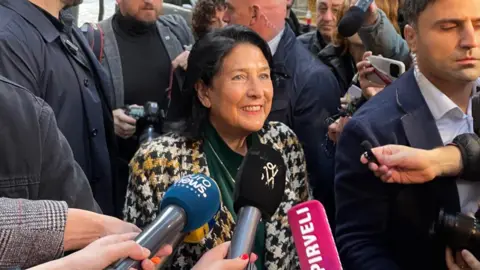 BBC
BBCGeorgians are going to the polls to choose whether to finish 12 years of increasingly authoritarian rule, in an election that will choose their future path towards the European Union.
Georgia borders Russia and the ruleing Georgian Dream party is accengaged by the opposition of moving away from the West and back into Russia’s orbit. The EU has frozen Georgia’s EU bid becaengage of “democratic backsliding”.
“I voted for a novel Georgia,” said pro-Westrict Pdwellnt Salome Zourabichvili.
Saturday’s vote has been portrayd as the most convey inant since Georgians backed indepfinishence from the Soviet Union in 1991. There were tells of scuffles and vote violations as tempers flared at polling stations.
About 3.5 million Georgians are eligible to vote until 16:00 GMT in this high-sgets election that the opposition is calling a choice between Europe or Russia, but which the rulement sketchs as a matter of peace or war.
Georgian Dream is expansively foreseeed to come first, but four opposition groups think they can combine forces to erase it from power and revive Georgia’s EU process.
Four out of every five voters are said to back combineing the EU in this South Caucasus state, which fought a five-day war with Russia in 2008.
It was only last December that the EU made Georgia a honestate. But that process was stoped after the rulement passed a Russia-style law that needs groups to enroll as “pursuing the interests of a foreign power” if they get 20% of funding from aexpansive.
Politics here has become increasingly sourly poloccurd, as Georgian Dream, under the guiding force of Georgia’s richest man, Bidzina Ifadevili, seeks a fourth term of power.
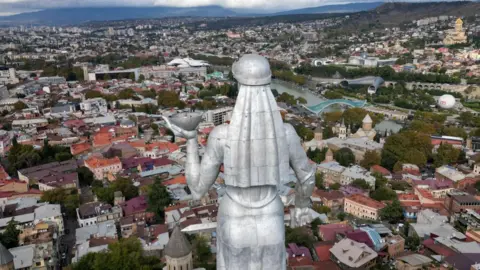 Matthew Goddard/BBC
Matthew Goddard/BBCIf Ifadevili’s party triumphs a huge enough convey inantity, he has vowed to prohibit opposition parties, notably the hugegest, the United National Movement.
Georgian Dream, comprehendn as GD, is set to triumph about a third of the vote according to opinion polls, although they are expansively seen as inconsistent. If GD is to be unseated, all four of the main opposition groups will have to triumph upwards of 5% of the vote to qualify for the 150-seat parliament.
Ifadevili’s rhetoric has become increasingly anti-Westrict and, after voting in Tbilisi, he telderly tellers that Georgians had a straightforward choice of either a rulement that served them, or an opposition of “foreign agents, who will carry out only the orders of a foreign country”.
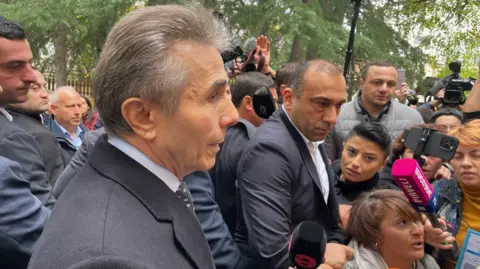
Pdwellnt Zourabichvili has been outspoken in her backing for a expansive opposition coalition rulement to finish “one-party rule in Georgia”. As she voted she said there would be people “who are victorious, but no-one will leave out”.
She has consentd a charter with the four huge groups so that if they triumph, a technocrat rulement will fill the instant vacuum. It would then reverse laws pondered detrimental to Georgia’s path to the EU and transfer to snap elections.
Tina Bokuchava, who’s chair of the hugegest opposition party, United National Movement, insists all credible polls put the opposition ahead.
But while Georgian Dream alerts voters they are still on course to combine the EU, it has also alerted them an opposition triumph will trigger war with Russia.
Party billboards show split pictures of deimmenseated cities in Ukraine aextfinishedside tranquil Georgia, with the slogan: “No to war! Choose peace.”
GD claims the opposition will help the West discleave out a novel front in Russia’s war in Ukraine, while Georgian Dream will upgrasp the peace with its Russian neighbour, which still occupies 20% of its territory after the 2008 war.
 Matthew Goddard/BBC
Matthew Goddard/BBCAlthough the ruleing party’s claim is unestablished and its billboards have been expansively condemned, its message materializes to have got thcimpolite.
In Kaspi, an industrial town to the north-west of Tbilisi, one woman aged 41 telderly the BBC: “I don’t enjoy Georgian Dream, but I antipathy the [opposition United] National Movement – and at least we’ll be at peace.”
Another woman called Lali, 68, said the opposition might convey Europe shutr, but they would convey war too.
Election seers have telled a number of violations at polling stations, including ballot stuffing and a physical strike on an opposition political figure in Marneuli, south of Tbilisi.
The International Society for Fair Elections and Democracy said almost one in 10 of their seers had telled violations at polling stations. On the eve of the vote it said people’s ID cards had been seized, and pointed to Russian-aided disalertation operations.
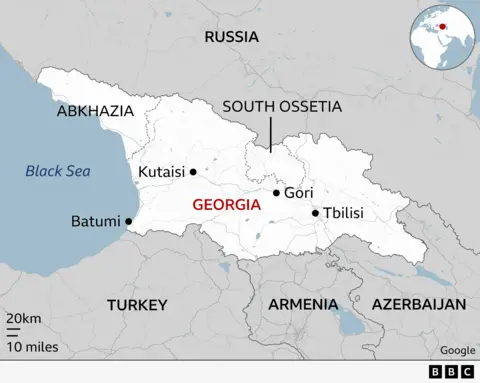
The BBC spoke to one voter, Aleksandre, in a village north-west of the capital who said he had been menaceened by a local GD man with losing his job if he did not sign up to vote for Georgian Dream: “I’m a bit sattfinishd of his menace but what can I do?”
Georgian Dream upgrasps it has made elections more see-thcoarse, with a novel electronic system for vote counting.
“For 12 years we have an opposition that asks the legitimacy of Georgia’s rulement constantly. And that’s absolutely not a normal situation,” says Maka Bochorishvili, GD’s head of the parliament’s EU integration promisetee.
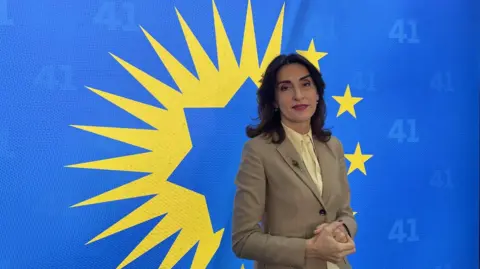
Critics say in some places there is a authentic trouble that the vote is not reassociate secret.
“All this speculation about forcing people to vote for certain political parties – at the finish of the day you’re alone and casting your vote, and electronic machines are counting that vote,” said Bochorishvili.
Not far from the centre of Tbilisi, Vano Chkhikvadze points to graffiti daubed in red on the walls and ground outside his office at the Civil Society Foundation.
After the “foreign sway” law was passed, in the face of mass protests in the centre of Tbilisi and other huge cities, he says he was personassociate tagled by Prime Minister Irakli Kobakhidze as a state traitor.
“We were getting phone calls in the middle of the night. Our kids even were getting phone calls. They were menaceened.”
Ahead of the vote, the EU alerted that Georgian Dream’s actions “signal a shift towards authoritarianism”.
Whoever triumphs, the leave outr is improbable to accomprehendledge loss easily.











